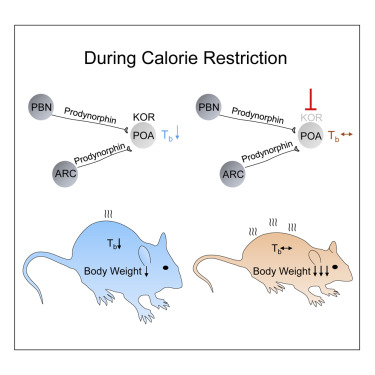当前位置:
X-MOL 学术
›
Curr. Biol.
›
论文详情
Our official English website, www.x-mol.net, welcomes your
feedback! (Note: you will need to create a separate account there.)
Activation of Kappa Opioid Receptor Regulates the Hypothermic Response to Calorie Restriction and Limits Body Weight Loss.
Current Biology ( IF 8.1 ) Pub Date : 2019-11-27 , DOI: 10.1016/j.cub.2019.10.027 Rigo Cintron-Colon 1 , Christopher W Johnson 2 , J Rafael Montenegro-Burke 3 , Carlos Guijas 3 , Lila Faulhaber 4 , Manuel Sanchez-Alavez 5 , Carlos A Aguirre 1 , Kokila Shankar 1 , Mona Singh 1 , Andrea Galmozzi 1 , Gary Siuzdak 6 , Enrique Saez 1 , Bruno Conti 7
Current Biology ( IF 8.1 ) Pub Date : 2019-11-27 , DOI: 10.1016/j.cub.2019.10.027 Rigo Cintron-Colon 1 , Christopher W Johnson 2 , J Rafael Montenegro-Burke 3 , Carlos Guijas 3 , Lila Faulhaber 4 , Manuel Sanchez-Alavez 5 , Carlos A Aguirre 1 , Kokila Shankar 1 , Mona Singh 1 , Andrea Galmozzi 1 , Gary Siuzdak 6 , Enrique Saez 1 , Bruno Conti 7
Affiliation

|
Mammals maintain a nearly constant core body temperature (Tb) by balancing heat production and heat dissipation. This comes at a high metabolic cost that is sustainable if adequate calorie intake is maintained. When nutrients are scarce or experimentally reduced such as during calorie restriction (CR), endotherms can reduce energy expenditure by lowering Tb [1-6]. This adaptive response conserves energy, limiting the loss of body weight due to low calorie intake [7-10]. Here we show that this response is regulated by the kappa opioid receptor (KOR). CR is associated with increased hypothalamic levels of the endogenous opioid Leu-enkephalin, which is derived from the KOR agonist precursor dynorphin [11]. Pharmacological inhibition of KOR, but not of the delta or the mu opioid receptor subtypes, fully blocked CR-induced hypothermia and increased weight loss during CR independent of calorie intake. Similar results were seen with DIO mice subjected to CR. In contrast, inhibiting KOR did not change Tb in animals fed ad libitum (AL). Chemogenetic inhibition of KOR neurons in the hypothalamic preoptic area reduced the CR-induced hypothermia, whereas chemogenetic activation of prodynorphin-expressing neurons in the arcuate or the parabrachial nucleus lowered Tb. These data indicate that KOR signaling is a pivotal regulator of energy homeostasis and can affect body weight during dieting by modulating Tb and energy expenditure.
中文翻译:

Kappa阿片受体的激活调节了对热量限制的低温反应,并限制了体重减轻。
哺乳动物通过平衡热量产生和散热来保持几乎恒定的核心体温(Tb)。如果维持足够的卡路里摄入量,这将以很高的新陈代谢成本维持下去。当营养缺乏或实验性减少(例如在卡路里限制(CR)期间)时,吸热可通过降低Tb来减少能量消耗[1-6]。这种适应性反应可以节省能量,限制因摄入热量少而导致的体重减轻[7-10]。在这里,我们表明这种反应是由κ阿片受体(KOR)调节的。CR与内源性阿片样物质Leu-脑啡肽的下丘脑水平升高有关,后者源自KOR激动剂前体强啡肽[11]。KOR的药理抑制作用,但对δ或μ阿片受体亚型没有抑制作用,完全阻断CR引起的体温过低,并在CR期间增加体重减轻,而与热量摄入无关。在接受CR的DIO小鼠中也观察到了类似的结果。相比之下,在随意喂养(AL)的动物中,抑制KOR不会改变Tb。下丘脑前视区KOR神经元的化学发生抑制作用降低了CR引起的体温过低,而弓状或臂旁核中表达前强啡肽的神经元的化学发生激活降低了Tb。这些数据表明,KOR信号传导是能量稳态的关键调节器,可通过调节Tb和能量消耗而在节食过程中影响体重。下丘脑前视区KOR神经元的化学发生抑制作用降低了CR引起的体温过低,而弓状或臂旁核中表达前强啡肽的神经元的化学发生激活降低了Tb。这些数据表明,KOR信号传导是能量稳态的关键调节器,可通过调节Tb和能量消耗而在节食过程中影响体重。下丘脑前视区KOR神经元的化学发生抑制作用降低了CR引起的体温过低,而弓状或臂旁核中表达前强啡肽的神经元的化学发生激活降低了Tb。这些数据表明,KOR信号传导是能量稳态的关键调节器,可通过调节Tb和能量消耗而在节食过程中影响体重。
更新日期:2019-11-27
中文翻译:

Kappa阿片受体的激活调节了对热量限制的低温反应,并限制了体重减轻。
哺乳动物通过平衡热量产生和散热来保持几乎恒定的核心体温(Tb)。如果维持足够的卡路里摄入量,这将以很高的新陈代谢成本维持下去。当营养缺乏或实验性减少(例如在卡路里限制(CR)期间)时,吸热可通过降低Tb来减少能量消耗[1-6]。这种适应性反应可以节省能量,限制因摄入热量少而导致的体重减轻[7-10]。在这里,我们表明这种反应是由κ阿片受体(KOR)调节的。CR与内源性阿片样物质Leu-脑啡肽的下丘脑水平升高有关,后者源自KOR激动剂前体强啡肽[11]。KOR的药理抑制作用,但对δ或μ阿片受体亚型没有抑制作用,完全阻断CR引起的体温过低,并在CR期间增加体重减轻,而与热量摄入无关。在接受CR的DIO小鼠中也观察到了类似的结果。相比之下,在随意喂养(AL)的动物中,抑制KOR不会改变Tb。下丘脑前视区KOR神经元的化学发生抑制作用降低了CR引起的体温过低,而弓状或臂旁核中表达前强啡肽的神经元的化学发生激活降低了Tb。这些数据表明,KOR信号传导是能量稳态的关键调节器,可通过调节Tb和能量消耗而在节食过程中影响体重。下丘脑前视区KOR神经元的化学发生抑制作用降低了CR引起的体温过低,而弓状或臂旁核中表达前强啡肽的神经元的化学发生激活降低了Tb。这些数据表明,KOR信号传导是能量稳态的关键调节器,可通过调节Tb和能量消耗而在节食过程中影响体重。下丘脑前视区KOR神经元的化学发生抑制作用降低了CR引起的体温过低,而弓状或臂旁核中表达前强啡肽的神经元的化学发生激活降低了Tb。这些数据表明,KOR信号传导是能量稳态的关键调节器,可通过调节Tb和能量消耗而在节食过程中影响体重。































 京公网安备 11010802027423号
京公网安备 11010802027423号